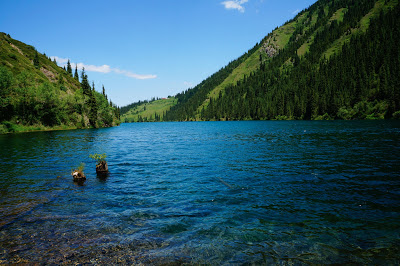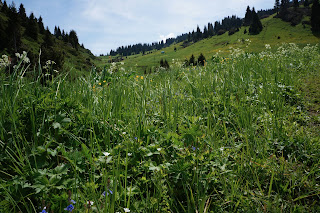By way of preface, this is a story that I've been working on for a while, it has appeared elsewhere (in a slightly altered form), but this is where it belongs.

Catching a ride in a gypsy taxi in Almaty, Kazakhstan is a bit like
hitchhiking, you stand on the side of the road, face the oncoming cars traveling in the direction you want to go, and stick your right
arm out with your flat palm pointing slightly down. When a driver
stops, quickly state your destination (usually in the form of a pair of
intersecting streets) and the amount of money you wish to pay (you can
indicate price with fingers – or learn the hundreds in Russian). If the
driver nods, you hop in; if not, you try again. When it is time to get
out, you can say “zdyes (здесь)” which means ‘here’ or simply gesture
to the place where you would like to stop.
Some people feel really uncomfortable with Gypsy Taxis but
I have not had a bad experience in one. Aside from the inevitable (and for the most part, innocent) flirtation when a driver finds out you are single, the experience is almost always
entertaining and a really great place to practice Russian.
A Typical Ride
I slowly walk backwards down Furmanova toward Satpaeva my arm
outstretched. Several waves of nice cars have already sped by without so
much as a glance in my direction. I can usually tell by the condition
of the car if the driver might stop – the nicer the car, the less likely
it is to stop. This isn’t always true of course. I was once given a
ride by the head of a computer firm. She told me that sometimes she
just likes the company on her commute.
A beat-up blue van with right-hand steering pulls out of the alley beside me.
“Where to?” The driver asks. “Shalapina-Pravda,” I say, adding “700”
almost as an afterthought. 700 Tenge is a lot to pay for an in-town
ride, but I’ve come to a comfortable system for determining my number: I
know that 500 Tenge will get me to and from almost anywhere so if I am
feeling impatient, I offer more. If I am short on cash, I offer less.
Today I am feeling particularly impatient.
The driver indicates the passenger seat with a nod of his head.
I
wrestle with the seat-belt as we turn into the busy Furmanova traffic.
A bit of the belt has folded and is stuck in the plastic guide above my
shoulder.
“Give it to me,” the driver says as slows to a stop at the
intersection. I hand him the belt and he gives it a firm tug, pulling
the fold free.
“Thanks,” I say, and then looking to the clasp, realize it is broken and won’t work anyways.
"Don't worry" he says. "I'm security." With that statement he casually tosses a blue document holder onto the dashboard. I take this to mean that any trouble we might have with the traffic police over me not wearing a seat-belt will quickly be settled with the display of the documents inside the sky blue cover.
The driver has a round, brown face with short dark hair and long
laugh lines radiating from the corners of his eyes. His blue jeans and
black nylon jacket look almost as well worn as his beat up van. “Where
are you from?” He asks me.
“I’m from America” I answer. “Where are you from?”
I realize that the question sounds ridiculous and possibly even rude, but he answers with a chuckle “I’m from here.”
“From Almaty?” I ask.
“No," he replies. "From Taldy-Kurgan.” I feel a certain smug justification at asking. Many people in Almaty are actually from other cities in Kazakhstan, and getting them to talk about home is one way to keep the conversation away from marriage and children.
“I heard that Taldy-Kurgan is a beautiful city.”
“Yes, very beautiful. Mountains, nature…Have you been there?”
“No, but I would like to go.”
“Call me if you want to go,” he offers.
As our conversation falters, I turn my attention to the long rows of
brown and grey communist-era buildings peeking from behind the row of
birch and elm trees that line Satpaeva. Every now and again we pass
blue or yellow signs that read “notary” or “Pharmacy” and, less
frequently, “store.” The car front of us abruptly pulls to the right to
pick up a fare and we swerve to avoid a collision.
“Are there many cars in America?” the driver asks, his right hand resting lazily on the knob fixed to the steering wheel.
“Yes, lots of cars, but not so many buses, or taxis. In Almaty there
are lots of cars and taxis, and lots of buses, and a good metro.” I can
only hope that in spite of my poor Russian I’ve managed to communicate that Almaty’s hodge-podge
but serviceable transit network is one of the things I admire most about
the city.
“Yes, but it’s dirty.” The man replies.
“Yes, the air is very dirty.” I agree glancing at the mountains that look pale and faded behind the brown haze.
“I was in Moscow for two years. The air there was dirtier.”
“Really?!” I ask incredulously.
“Really” the driver answers.
“Why were you in Moscow?” I ask.
“For work” he answers.
Just ahead of us, I see the bright red sign for the Kimex shoe store at the corner of my intersection, so I pull a
folded blue 500 Tenge note out of my pocket and fish for the 100 Tenge
coins in my coin purse. “Here please." The driver pulls over
to the sidewalk. “Thank you very much” I say as I hand him the money.
“I’ll call you when I go to Taldy-Kurgan.”

 To reach the Kolsai lakes, you drive east from Almaty turning south just before crossing Charyn Canyon. The landscape shifts from the red rocks of the Charyn Canyon, to rounded green hills somehow reminiscent of hobbiton. As the road leads into the mountains, it deteriorates drastically, and the last 30 kilometers involve the arduous dodging of dangerous potholes.
To reach the Kolsai lakes, you drive east from Almaty turning south just before crossing Charyn Canyon. The landscape shifts from the red rocks of the Charyn Canyon, to rounded green hills somehow reminiscent of hobbiton. As the road leads into the mountains, it deteriorates drastically, and the last 30 kilometers involve the arduous dodging of dangerous potholes. By the time we reached the first lake on Friday evening, it was well after dark. We paid the park fees, camp fees (750 tg per tent) went about setting up camp in the dark. Our evening ended with a delicious burrito dinner, and a roaring fire with s'mores beneath the nearly full supermoon.
By the time we reached the first lake on Friday evening, it was well after dark. We paid the park fees, camp fees (750 tg per tent) went about setting up camp in the dark. Our evening ended with a delicious burrito dinner, and a roaring fire with s'mores beneath the nearly full supermoon.



































